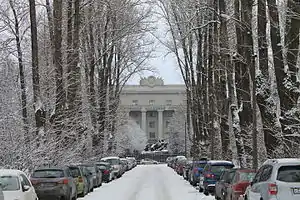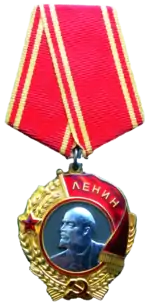Budyonny Military Academy of the Signal Corps
The S. M. Budyonny Military Academy of the Signal Corps is a military university in Saint Petersburg, Russian Federation, founded in 1919. The academy trains officers for service in the Signal Troops of the Russian Ground Forces.
Военная академия связи им. С. М. Буденного | |
 Campus of the MAC, S.M. Budyonny | |
| Type | Military academy |
|---|---|
| Established | 1919 |
| Rector | Major general S. V. Kostarev |
| Students | more than 32,000 officers (national) more than 4,500 officers (international) |
| Address | 194064, Saint Petersburg, Tichorezki prospect 3 , , |
| Campus | Urban |
| Website | vas.mil.ru |
History
- 1919 (8 November). Foundation of the academy. Initial name: Electro-technical high school for commanding officers of the workers' and farmers' Red Army (Russian: Высшая военная электротехническая школа комсостава Рабоче-крестьянской Красной Армии (РККА))
- 1941 (21 January). By order of the People’s Commissar of Defence of the USSR this military college was renamed to Military Academy of Signal Technology (Russian: Военная электротехническая академиа связи).
- 1946 (5 July). The Military academy received the name of honour S. M. Budyonny.
- 1998 (29 August). By decree №1009 of the Government of Russia the Military academy received the status of a Military university.
Awards
The military academy was many times distinguished and awarded as follows:
- November, 7th 1944 with the Order of the Red Banner
- February, 22nd 1968 with the Order of Lenin

Order of the Red Banner, 1944

Order of Lenin, 1968
Subjects / purpose of study
Academic qualification (university degree) for officers attached for special duties. Special subjects
- 210401 — Physics and communications technology of optoelectronics
- 210404 — Multichannel telecommunication’s systems
- 210405 — Radio engineering, broadcasting (BC) and television (TV)
- 210406 — Communications networks and electronic switching systems (ESS)
- 230101 — Computing technology, complex installations, systems and networks
- 230102 — IT-systems and automated command and control systems
- 230105 — Programming of computer systems and of automated systems
The duration of study is 5 years. Instruction takes place daily around the clock.
Heads of the Academy
- 1919—1921 — A.V. Babinski (ru: А.В. Бабински)
- 1921—1922 — E.A. Bernardelli (ru: E.A. Бернарделли)
- 1922—1927 — A.A. Ovchinikov (ru: A.A Овчиников)
- 1928—1932 — Professor E.A. Svirsky (ru: E.A. Свирский)
- 1932—1937 — K.E. Polishchuk (ru: K.E. Полищук)
- 1937—1938 — M.I. Dratvin (ru: M.И. Дратвин)
- 1938—1938 — N.N. Andreyev (ru: H.H. Андреев)
- 1938—1942 — Lieutenant General V.M. Govyadkin (ru: B.M. Говядкин)
- 1942—1944 — Major General A.G. Lapkin (ru: A.Г. Лaпкин)
- 1944—1949 — Lieutenant General K.Kh. Muravyev (ru: К.Х. Муравьев)
- 1949—1951 — Lieutenant General P.D. Miroshnikov (ru: П.Д. Мирошников)
- 1951—1961 — Lieutenant General V.V. Zvenigorodsky (ru: B.B. Звенигородский)
- 1961—1974 — Colonel General A.A. Frolov (ru: А.А. Фролов)
- 1974—1978 — Lieutenant General A.P. Borisov (ru: А.П. Борисов)
- 1978—1988 — Lieutenant General N.G. Popov (ru: Н.Г. Попов)
- 1988—1991 — Lieutenant General P.N. Barashkov (ru: П.Н.Барашков)
- 1991—1995 — Lieutenant General G.G. Savin (ru: Г.Г. Савин)
- 1995—1998 — Lieutenant General S.P. Liguta (ru: С.Р. Лигута)
- 1998—2003 — Lieutenant General E.A. Karpov (ru: Е.А. Карпов)
- 2003—2009 — Lieutenant General A.L. Kremenchutsky (ru: А.Л. Кременчуцкий)
- 2009—2011 — Major General S.A. Budilkin (ru: С.А. Будилкин)
- 2011— ... — Major General S.V. Kostarev (ru: С.В. Костарев)
Famous graduates and lecturers
- Vladimir Varyukhin - the listener (10.07.1945 — 23.05.1951) and the lecturer (23.05.1951 — 18.11.1961)
- Anatoly Dorofeyev (1920—2000), Hero of the Russian Federation. From April to October 1943 — student (intensive course) on the Command-Engineer-Faculty of the Military Academy of Signal Technology (at that time — evacuated to the town of Tomsk).
See also
External links
This article is issued from Wikipedia. The text is licensed under Creative Commons - Attribution - Sharealike. Additional terms may apply for the media files.